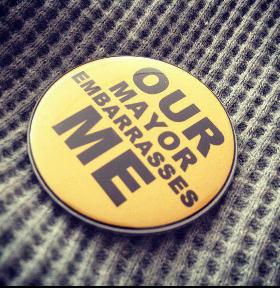
Roy Mitchell's popular buttons articulate how many feel about Toronto's mayor. Credit: Courtesy photo
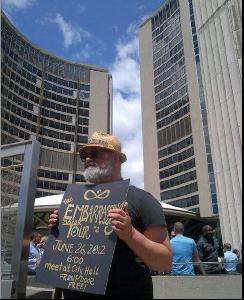
Roy Mitchell will host the last Embarrassing Mayor Tour on Valentine's Day. Credit: Courtesy photo
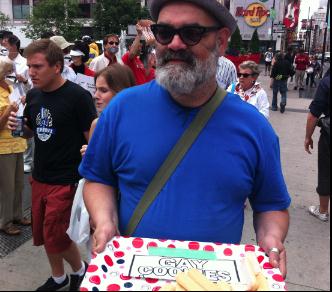
Roy Mitchell hands out "gay cookies" to religious parents at an anti-Bill 13 protest last year. Credit: Andrea Houston
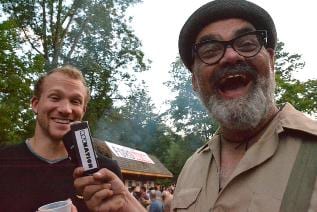
Roy Mitchell interviews a member of Ford Nation, at Ford Fest, for his radio show Roynation. Credit: Andrea Houston
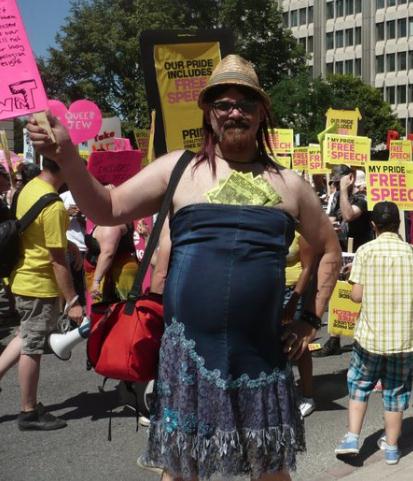
Roy Mitchell in drag with the Pride Coalition for Free Speech protesting censorship at Pride Toronto. Credit: Mitchell's Facebook
Roy Mitchell — the subversive activist who’s part journalist, part performance artist and all whimsical — has resigned from the Pride Toronto board to prepare for 2014, when he says he will likely challenge Rob Ford in a run for mayor.
And he’s totally serious.
“I joke about it, but I don’t joke about it,” says Mitchell, who resigned from the board Jan 12 with a heavy heart. He says he will always support Pride, but as planning kicks into high gear for WorldPride in 2014, he says he is feeling increasingly alienated and uninspired.
Since Ford was elected, Mitchell has, like many in Toronto, taken an acute interest in city politics and responded with playful and mischievous rabble-rousing that’s been like a glitter bomb to the floor of city council. His famous buttons, which have graduated from “Our Mayor Embarrasses Me” to “Our Mayor Disgusts Me,” have become ubiquitous in some political gay circles. The buttons can also be spotted on the lapels of those taking part in his series of Embarrassing Mayor Tours. The tours include a stroll around city hall — the last is on Valentine’s Day.
Mitchell knows there will be those who will scoff if he runs for mayor, but he’s undeterred.
“I mean really, why not me? You could run the Ikea monkey and he’d do a better job as mayor than Rob Ford,” he says.
Mitchell, who has been executive director of Trinity Square Video for 10 years, is a long-time resident of the Junction Triangle. He says it’s not unprecedented for voters to send a message by electing a long-shot candidate. He cites comedian Jón Gnarr, the unlikely mayor of Iceland’s capital, who grabbed control in 2011 with an irreverent campaign. “He started off as a joke, but he got elected because he could mobilize people. And people like him,” Mitchell says.
Then there’s Ilona Staller, or Cicciolina, the Italian pornstar turned MP who continued to make porn after she was elected to public office.
“We need a mayor who brings people together, and Rob Ford just doesn’t, except for all the wrong reasons,” Mitchell says. “He divides the community. He divides people.”
In 2010, performance artist and gay provocateur Keith Cole entered the political ring, knowing he had little chance of winning. Mitchell says Cole wanted to raise awareness about arts funding and cycling infrastructure.
“It was a fun campaign and he got people’s attention,” Mitchell says.
Mitchell was first elected to the Pride board in 2010 when it was embroiled in a public scandal. The organization was then led by Tracey Sandilands, who made the decision to ban the group Queers Against Israeli Apartheid (QuAIA) from the parade.
Some community members formed the Pride Coalition for Free Speech (PCFS) and Sandilands was eventually forced to reverse her decision, but the damage was done. The community’s trust in Pride was at an all-time low. That’s when Mitchell’s name was added to the ballot, among other PCFS activists who stepped up for election to the board.
“He was our sacrificial lamb,” says board member Mark Smith, who was a member of PCFS at the time. “He was the community’s representative at a time when we really needed that voice on the board.”
PT board co-chair Francisco Alvarez says the board didn’t always agree with Mitchell, but his voice was valued.
“He was elected to bring that [radical] voice to the board, and he has done that,” he says. “Because of him we looked at things perhaps a little different than we would have before.”
But now Mitchell says his job is done. He’s not leaving PT in anger. New board members have brought a fresh energy to Pride and he says it’s in good hands. The financials are stable, the censorship scandal is in the past, and there’s a new executive director at the helm who has earned back much of the community’s trust.
Yet Mitchell says he’s leaving an organization that he feels is no longer radical, at least not radical enough for him.
“I just think Pride should be queer,” he says. “And for me, it’s not queer enough.”
Over Pride’s 33-year history, the festival has mushroomed into one of the largest Pride parades in the world. In growing so big, Mitchell says, certain qualities have been lost.
The best thing to happen to Pride in years, he says, was the creation of Queers for Social Justice, made up of members of several local groups who organized the night march and die-in demonstrations during Pride Week in 2012. Mitchell says Pride would be wise to keep these groups close — and, in doing so, keep a close connection to its activist roots.
Gary Kinsman, founding member of the Toronto Lesbian and Gay Pride Day Committee, says Mitchell raises a number of important issues that, in many ways, are not new. He says Pride risks becoming a festival for only upper-class gay men, united politically by sexual orientation. “There’s a real danger of Pride becoming a homonationalist project,” he says. “It’s important to have different visions for organizing.”
Mitchell has also clashed with the board on other key decisions. He has never supported the dispute-resolution process (DRP), which was established to make the final decision on complaints against parade participants. So far, this process has been used only for QuAIA.
“As a board we have the power to just make a decision and [tell people who complain], ‘If you don’t like what we decide, vote us out.’ To rely on this legalese, this professionalization of a community event, it just didn’t sit right with me.”
He also wasn’t happy about Pride’s decision to award the 2012 co-grand marshal title to Liberal Education Minister Laurel Broten, who was slow to support explicit language for gay-straight alliances in Bill 13. “I have no issue with Cheri DiNovo getting it. She identifies as queer, was at the first queer picnic, and has been fighting for this community.”
Then there was Pride’s decision to make the 2012 musical headliner a non-queer artist. “I also think Corey Hart was a big mistake. He might have been a financial bonus. He may have sold more beer. But the purpose of this party is not to sell beer. This party is about building community.
“The queer community needs to stop trying to be accepted by a bunch of straight people,” he says.
Mitchell is also concerned about the direction PT is taking as it plans for WorldPride.
“I’m just not that enthusiastic about WorldPride,” he admits. “It will be a great event, but Toronto’s Pride is always a world Pride. What will be so different? I still don’t really understand what WorldPride is.”
Each year, Mitchell says, he sees Pride growing bigger and bigger, with more and more corporations taking part. Now, with the attention shifting to WorldPride, he says, the board has been focusing on making business partnerships, and fewer relationships with community groups.
The WorldPride logo is a great example of that, he says. Designed at no cost by Tourism Toronto, the logo is representative of the growing divide between Pride and its roots as a radical queer liberation movement.
“How radical are we if we attract these corporations? We have a parade where the military marches,” he says. “You have to wonder how many restrictions are put on Pride when you’re working with those big companies.”
“Pride is so big now that it has become a city-wide event, a major tourist event, and I sometimes think you lose the queer in all that.”
But Alvarez says WorldPride is not supposed to be an expression of radical queer politics.
“[WorldPride] is attempting to represent a number of different voices, from politically left to right, and represent all the different communities in the [LGBTTIQQ2SA] acronym,” he says. “WorldPride doesn’t have a single corporate sponsor at this moment.”
The WorldPride committee is hosting a forum on funding opportunities for artists, social justice activists and community organizations that have ideas for human-rights, community-engagement or arts-based projects for the 2014 international festival. Mitchell plans to attend the Feb 6 forum, which will be held at the 519 Church Street Community Centre, and for the first time in two years, he won’t be there as a board member.
With PT now behind him, Mitchell says he wants to focus on smaller community activist projects, like the Honey Badger Neighbourhood Gay Club he started two years ago to resist gentrification in the Junction Triangle.
And, until his 2014 mayoral campaign kicks off, Mitchell will continue to host Roynation, his popular radio show on Blog Talk Radio. Roynation will broadcast live from the Rhubarb Festival at Buddies in Bad Times Theatre on Feb 20 at 6:30pm.
“I want to do things that bring me closer to community. So this is the beginning of a new chapter for me,” he says.
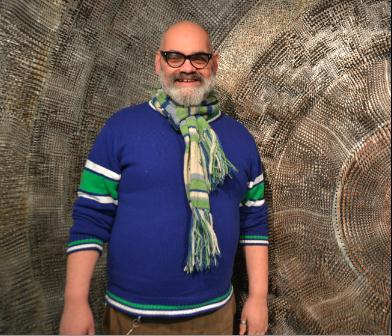
 Why you can trust Xtra
Why you can trust Xtra


